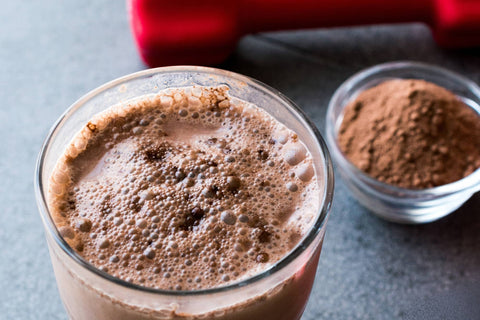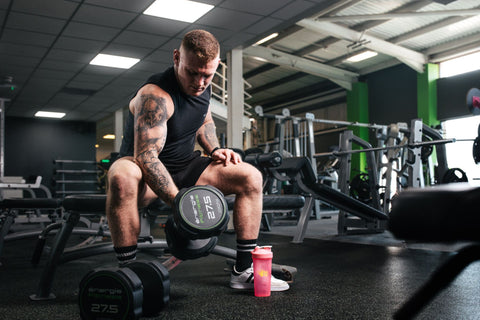We have all seen videos of TikTok users showcasing their versions of “proffee,” the blend of coffee and protein powder that's taking morning routines by storm. This combination promises the best of both worlds: the energising kick of caffeine with the power of protein.
But beyond the trend, is adding protein powder to coffee a good idea or just another viral trend?
Let’s find out...
Understanding Protein Powder
Protein powder is a dietary supplement made by grinding dry protein sources like whey, casein, soy, or rice into a fine powder. It's a popular choice among athletes and fitness enthusiasts looking for a convenient way to boost their protein intake.
Protein powder is available in various flavours, so you can easily find one you enjoy.
Types of Protein Powder
- Whey Protein: Fast-absorbing, derived from milk, ideal for post-workout recovery.
- Casein Protein: Slow-digesting, also from milk, perfect for providing sustained protein release, especially overnight.
- Soy Protein: A complete plant protein that offers all essential amino acids. It is suitable for vegetarians and those who are lactose intolerant.
- Pea Protein: Plant-based, known for its digestibility and hypoallergenic properties.
Benefits of Protein Powder
Protein powder is a convenient source of nutrition that brings many health benefits to those looking for a balanced diet. This includes:
Muscle Repair and Growth
Research shows that protein supplements can enhance muscle size and strength in individuals engaging in resistance exercise, such as weightlifting.
The amino acids in protein powders help repair the microtears in muscle fibres that occur during exercise, promoting muscle recovery and growth.
Studies also indicate that protein supplementation can accelerate muscle protein synthesis, the process that helps muscles grow stronger and larger.
Bone Health
Beyond muscle repair, protein intake is crucial for bone health. Dietary protein can increase bone mineral density and reduce the risk of fractures, especially when paired with strength training.
Enhanced Recovery
Post-exercise recovery is vital for long-term fitness and muscle conditioning. Many studies report that protein supplements after workouts can aid recovery by reducing muscle damage and improving overall muscle performance.
This rapid recovery allows for more consistent and intensive training sessions.
Weight Management
High-protein diets are effective for weight loss. Protein's high thermic effect means it requires more energy to metabolise than fats and carbohydrates. This increased metabolic rate can help burn more calories, thus aiding in weight management.
Furthermore, because protein increases feelings of fullness, it can help reduce overall calorie intake by curbing hunger.
Nutritional Convenience of Protein Powder
The recommended daily intake for individuals trying to build muscle is between 1.2 and 2.0 grams per kilogram of body weight. Protein powder makes reaching these higher protein goals easier without consuming large quantities of food.
Why Coffee for Fitness?
Coffee is a staple in many morning routines because it provides an energy boost. But for fitness enthusiasts and athletes, coffee goes beyond being a morning pick-me-up.
The benefits of coffee for individuals looking to improve their physical performance include:
Boost in Performance
Caffeine, the active ingredient in coffee, is an effective ergogenic aid that enhances physical performance. Studies have shown that caffeine can improve aerobic endurance, muscular strength, and muscle power during activities like sprinting, jumping, and throwing activities.
Enhanced Fat Utilisation
Another benefit of consuming caffeine before exercise is that it helps your body use fat for energy instead of glycogen, which is the primary energy reserve in your muscles. This shift helps conserve these vital energy stores, allowing you to maintain endurance and perform at a higher level for longer before feeling exhausted.
Mental Focus and Reduced Fatigue
Caffeine activates the central nervous system, improving focus and reducing the perception of fatigue. This mental clarity and alertness are crucial during workouts, where concentration on form and endurance can significantly impact performance.
Furthermore, caffeine increases the production of beta-endorphins during exercise, providing a feeling of wellness and the "high" many experience post-workout.
Hormonal Impact
Caffeine stimulates the release of epinephrine (adrenaline), the hormone responsible for the "fight or flight" response. This surge in adrenaline can increase performance, making it easier to achieve high-intensity training goals.
Thermogenesis and Calorie Burning
Caffeine can increase thermogenesis, or heat production, in the body. This process raises body temperature and enhances calorie burning, which can benefit weight management and metabolic health.
Potential Perks of Taking ”Proffee”
Incorporating "proffee" into your diet could be a practical way to enhance both nutritional intake and physical performance. Some potential benefits you may gain from adding protein powder to your morning coffee include:
- Enhanced Nutritional Value: By adding protein powder to coffee, you get a morning caffeine kick and boost your protein intake in one cup. This combination helps you meet daily protein requirements for muscle repair, bone health, and overall metabolic function.
- Sustained Energy Release: While coffee alone can give you a quick burst of energy, adding protein can help stabilise blood sugar levels and extend the energy boost. Protein helps slow the absorption of caffeine into the bloodstream, providing more sustained energy without the usual mid-morning crash.
- Improved Workout Performance: Caffeine enhances physical performance by increasing strength, endurance, and reducing the perception of effort during exercise. Combining this with protein, which supports muscle recovery and growth, can make your workouts more effective.
- Appetite Control: Protein is highly satiating, which can help curb hunger and prevent overeating. Starting your day with a protein-enriched coffee can keep you feeling full longer, which is beneficial if you’re trying to manage your weight.
- Convenience: For many, mornings are rushed. "Proffee" offers a quick and easy way to consume a nutritious breakfast, combining the benefits of coffee and protein shakes. This is especially useful for those who might skip breakfast or are looking for a speedy option that supports their dietary and fitness goals.
- Metabolic Benefits: Both caffeine and protein have thermogenic properties, meaning they can increase metabolism and calorie burning. Caffeine increases thermogenesis, which helps burn more calories, while protein has a high thermic effect and boosts metabolic rate.
Scientific Insights on "Proffee"
As the popularity of "proffee" grows, examining the scientific evidence supporting its health claims is essential. Current research primarily focuses on the separate benefits of protein and caffeine, suggesting potential advantages when combined.
However, the scientific community still needs to investigate the synergistic impact of this combination thoroughly. More dedicated studies are needed to fully understand and validate the specific benefits "proffee" enthusiasts claim.
Things to Consider Before Brewing Up Proffee
While the benefits of "proffee" seem promising, there are a few considerations to keep in mind before making it a part of your daily routine:
- Digestive Comfort: Not everyone digests protein powder and caffeine similarly. Some individuals might experience digestive issues such as bloating or discomfort, especially when consuming protein with hot beverages like coffee.
- Pick Your Protein Powder Wisely: Not all protein powders are created equal. Whey protein tends to clump in hot liquids, so opt for whey isolate or plant-based varieties for a smoother coffee experience.
- Quality of Ingredients: The type of protein powder used can significantly affect both the health benefits and the taste of your "proffee." Opt for high-quality, low-additive protein powders to ensure you get the best nutritional value without unnecessary fillers or sweeteners.
- Caffeine Sensitivity: If you're sensitive to caffeine, adding protein might not mitigate the potential side effects of caffeine consumption, such as jitteriness, anxiety, or heart palpitations. It's important to adjust the amount of coffee according to your personal tolerance levels.
- Listen to Your Body: Coffee can impact sleep and anxiety in some people. If you experience jitters or digestive issues after consuming proffee, it might not be the best choice for you.
- Temperature Matters: For best results, mix your protein powder with a small amount of cool or warm liquid first, then add your hot coffee. This helps prevent clumping.
- Timing of Consumption: Drinking "proffee" pre-workout can be beneficial due to caffeine's performance-enhancing effects and protein's muscle-supportive properties. However, consuming it late in the day might interfere with sleep due to caffeine's stimulatory effects.
Final Thoughts: Protein Powder in Coffee—More Than Just a Trend?
So, is adding protein powder to coffee a good idea or just a fad?
Given the benefits discussed, "proffee" can be a great addition to your dietary routine to enhance nutritional intake, boost physical performance, and manage your appetite effectively. However, it's essential to consider individual factors like digestive comfort and caffeine sensitivity before jumping on the bandwagon.
Remember: While proffee might offer some benefits, it shouldn't replace a well-rounded diet. Ensure you get enough protein and other essential nutrients from whole food sources.
Discover Your Perfect "Proffee" Blend with Fenix Active
Ready to try "proffee" for yourself? Start with the right ingredients.
Explore Fenix Active's range of high-quality protein powders, designed to blend smoothly with your coffee while providing the nutritional boost you need to power through your day. Check out our selection to find the perfect match for your fitness and health goals.


